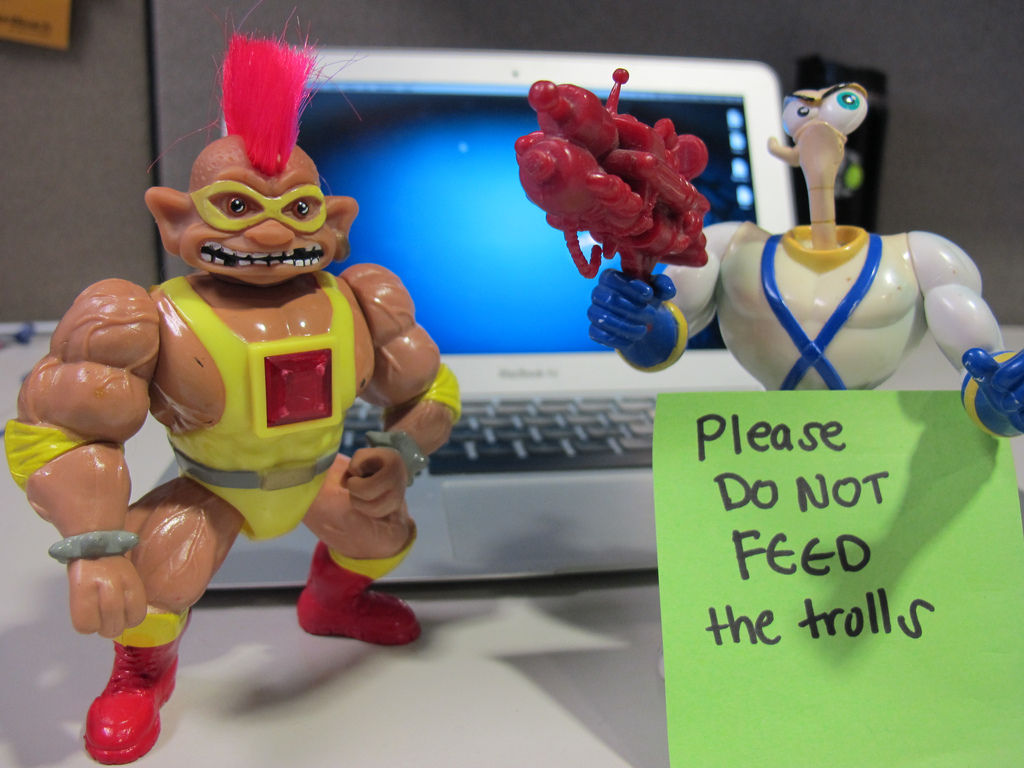As someone who writes numerous blog posts each month, I’m not exactly a stranger to being attacked by trolls. Frankly, I really don’t care if the trolls attack my work. I have been writing for long enough to know that trolls are going to do what they do. However, it bothers me to no end to see Internet trolls attack other people. As such, I wanted to take the opportunity to talk about a few strategies for dealing with trolls.
Are you really dealing with a troll?

When someone responds to you with a nasty comment or a mean tweet, I recommend taking just a second to consider whether the person is really a troll or not. It’s a weird question for sure, but the person who left the nasty post might not be a troll per se, but, if it is a business setting, it might be an upset customer. While a troll probably just wants to watch the online world burn, an upset customer is probably lashing out because they feel that they have been wronged in some way.
If a post is from a disgruntled customer, then it is clearly in your best interest to try to defuse the situation. Acknowledging the customer’s complaint and trying to make things better is a good start.
Of course, sometimes customer complaints can be rather strange, to the point of making one wonder if the complaint is legitimate, or if it is some kind of a joke. Let me give you an example. A few years ago, I received an irate message from someone who had purchased a book that I had written. The guy wasn’t upset with the book’s accuracy or its subject matter, but rather the ink used to print the book. The ink wasn’t dark enough to suit his tastes, and he lambasted me for it.
So was the email from someone who had actually bought my book, or was it from a troll? Honestly, I have no idea. The message could have come from either one. I decided to play it safe and put the guy in touch with the book’s publisher, who was able to send him a digital copy of the book.
What is the troll’s motivation?
The key to dealing with Internet trolls is to understand the troll’s motivation. The troll may think they are being funny, or the troll could be someone who just wants to hide behind anonymity as they spew vulgar insults. Another possibility is that the troll could be someone who has a fundamental disagreement with you and feels justified in calling you out over it.
Dealing with the first two types of Internet trolls is easy. Ignore them and they will usually go away. Remember, by posting amusing or vulgar comments, the troll is essentially crying out for attention. They want to be noticed. If you respond, then you are giving them exactly what they want.
Those who have a fundamental disagreement with you are a little bit trickier to deal with. After all, they probably feel as though they are doing the world a favor by pointing out just how stupid and/or evil they think that you are. Keep in mind that these types of posts can be tied to just about anything. Someone may be on the opposite side of the political aisle from you, or the troll might be a fan of a rival sports team. In the IT world, I have seen Mac fanboys attack PC sites, and visa-versa. Sometimes, attacks can even come from places that are truly unexpected.
As many of you know, I have spent the last several years training for a space mission. During that time, I have occasionally been trolled by people who believe that the Earth is flat and that the idea of the Earth being round stems from some sort of vast government conspiracy. I don’t want to use this article as a platform for taking cheap shots at flat Earthers, because I believe that everyone is entitled to their own opinion. I only bring up the flat Earthers as a way of illustrating that trolling can come from some really unexpected places.
Dealing with activist Internet trolls
If someone is trolling you because they feel that they have a duty to call you out over your beliefs, then that troll is essentially an activist. Depending on the individual person who is doing the trolling, ignoring the troll may or may not work. Sometimes, however, you may not even have to worry about it. I have seen a number of examples over the years of online communities taking it upon themselves to “take out the trash” without the site’s owners or moderators ever having to get involved.
If you are having a problem with activist trolls, then my advice would be to be extraordinarily careful about engaging them. You can never be sure of exactly how far the troll might be willing to go. You should assume that their goal is to take you down. By engaging such a person, you may be walking into a trap. I recently read an article on Alternet in which several Internet trolls were interviewed and asked what it is that makes them troll. One of the Internet trolls interviewed stated, “I have no problem screencapping someone’s online comments and sending it to their employer, and yes, I have had people terminated from their jobs for things they’ve said online.”
Let that one sink in for a moment. There are Internet trolls out there who believe that if you disagree with them, then your livelihood needs to be taken away. Such a person would presumably try to bait you into saying something regrettable, just so that they can use your words as ammo to get you fired from your job. Who knows what else someone like that might try. That’s why I recommend that you avoid engaging trolls if at all possible.
Preventative measures

Some online platforms have completely eliminated the ability to post comments as a way of getting rid of the trolls. Although this approach is effective, it also means that the platform loses any sense of community, and it makes it difficult for people to get their questions answered or to provide helpful advice.
Another approach is to use moderators to get rid of any offensive comments before anyone sees them. This seems to be the approach that most sites are using right now.
Another option may be to use software to help put a stop to trolling. A company named Authenteq offers an anti-trolling tool called Trollteq, which is designed to prevent bots or people who are using fake accounts from posting comments on your site. The software works by using blockchain-based identity management but does not seem to do any content filtering.
My guess is that within the next couple of years, we will probably see products emerge that use AI as a means of policing Web posts. I think that the only reason that such products are not already being widely used is that every AI tool requires training, and the training for an anti-trolling application would be tricky. While the vendor would probably be able to do some basic training, the fact remains that posts that are considered acceptable on one website might be considered trolling on another. Let me give you a really simple example. If I were to post a comment saying “go big blue!” to a Kentucky Wildcats fan board, the comment would no doubt be well received. If I were to post the same comment to a fan board dedicated to bitter rivals the Louisville Cardinals, the comment would not be taken well.
With that in mind, I do think that AI-based anti-trolling software could work. However, I think that site moderator will probably have to do a lot of training before such software could be effective.



